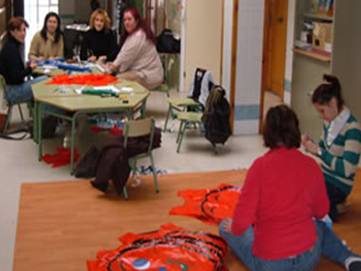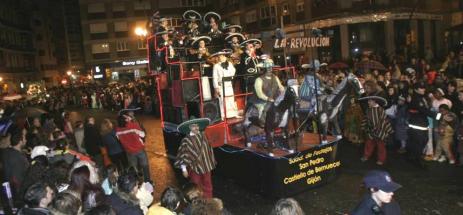HEALTHY CARNIVAL AT GLORIA FUERTES SCHOOL
We want to promote healthy food. Based in a project this year we choose fruit as the topic to be dressed up. Last year it was the different cultures. /View more.../
The main aims are:
• Enjoy ourselves,
• Know our traditions.
• Have an experience of collaboration
Families are involved and participate, for example, helping with the costumes
• Enjoy ourselves,
• Know our traditions.
• Have an experience of collaboration
Families are involved and participate, for example, helping with the costumes
We have celebrated the Carnival since some years ago with a primary school. There is a celebration with dancing, songs and a parade
HISTORY
WHAT is carnival?
It is an annual celebration of life found in many countries of the world. And in fact, by learning more about carnival we can learn more about ourselves and a lot about accepting and understanding other cultures.
WHERE did the word “carnival” come from?
Hundred and hundreds of years ago, the followers of the Catholic religion in Italy started the tradition of holding a wild costume festival right before the first day of Lent. Because Catholics are not supposed to eat meat during Lent, they called their festival, carnevale — which means “to put away the meat.” As time passed, carnivals in Italy became quite famous; and in fact the practice spread to France, Spain, and all the Catholic countries in Europe. Then as the French, Spanish, and Portuguese began to take control of the Americas and other parts of the world, they brought with them their tradition of celebrating carnival.
WHEN?
The first day before Lent. In Western Christianity, Lent is the forty-day period (or season) preceding Easter always falls on a Sunday between March 22 and April 25, roughly corresponding to early spring in the Northern Hemisphere Easter lasting from Ash Wednesday to Holy Saturday (Easter Even).
WHY?
The inspiration for the carnival lies in the fact that during Lent, traditionally no parties may be held and many foods, such as meat, are forbidden; the forty days of Lent serve to commemorate the Passion of Jesus. It is natural for people to have the desire to hold a large celebration at the last possible opportunity before fasting.
HOW?
It typically involves a public celebration or parade combining some elements of a circus and public street party. People often dress up or masquerade during the celebrations
CARNIVAL IN GIJÓN
--> It is considered a local holiday with a big parade.
--> It is a festival of cultures.
--> We show our traditions
--> We criticize problems of our society
--> And have fun!
It is an annual celebration of life found in many countries of the world. And in fact, by learning more about carnival we can learn more about ourselves and a lot about accepting and understanding other cultures.
WHERE did the word “carnival” come from?
Hundred and hundreds of years ago, the followers of the Catholic religion in Italy started the tradition of holding a wild costume festival right before the first day of Lent. Because Catholics are not supposed to eat meat during Lent, they called their festival, carnevale — which means “to put away the meat.” As time passed, carnivals in Italy became quite famous; and in fact the practice spread to France, Spain, and all the Catholic countries in Europe. Then as the French, Spanish, and Portuguese began to take control of the Americas and other parts of the world, they brought with them their tradition of celebrating carnival.
WHEN?
The first day before Lent. In Western Christianity, Lent is the forty-day period (or season) preceding Easter always falls on a Sunday between March 22 and April 25, roughly corresponding to early spring in the Northern Hemisphere Easter lasting from Ash Wednesday to Holy Saturday (Easter Even).
WHY?
The inspiration for the carnival lies in the fact that during Lent, traditionally no parties may be held and many foods, such as meat, are forbidden; the forty days of Lent serve to commemorate the Passion of Jesus. It is natural for people to have the desire to hold a large celebration at the last possible opportunity before fasting.
HOW?
It typically involves a public celebration or parade combining some elements of a circus and public street party. People often dress up or masquerade during the celebrations
CARNIVAL IN GIJÓN
--> It is considered a local holiday with a big parade.
--> It is a festival of cultures.
--> We show our traditions
--> We criticize problems of our society
--> And have fun!

